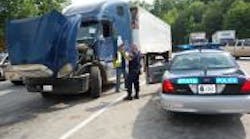“At the end of the day, the UCR (Unified Carrier Registration) fee directly affects the ability of states to carry out commercial vehicle safety enforcement – and that helps the industry by getting unsafe operators off the road.” –Stephen Keppler, interim executive director, Commercial Vehicle Safety Alliance
Many truckers view the Unified Carrier Registration (UCR) fee as nothing more than an extra tax on their business – and in some ways, they are correct, for several of the 41 states that are participating in the UCR program this year deposit the fees straight into their general revenue fund, as opposed to designating UCR-generated monies to fund commercial vehicle safety enforcement efforts alone.
It’s important to note, too, that the UCR is broadly applied in the trucking space. All motor carriers – for-hire, private and exempt – as well as brokers, freight forwarders, and leasing companies operating in interstate or international commerce are subject to the UCR. Entities based in Canada and Mexico that are involved in interstate or international commerce in the U.S. also are subject to the UCR fee.
However, the industry really should not look at it as a “tax,” Stephen Keppler, interim executive director for the Commercial Vehicle Safety Alliance (CVSA) told me recently.
Keppler said the goal for the UCR is to keep up a healthy level of funding available for state safety enforcement efforts – one that isn’t directly tied to yearly budgets, which, due to the fallout from the global recession these last few years, are getting slashed left and right.
“The UCR is one piece of the puzzle designed to alleviate those budgetary pressures so we can keep the focus on getting bad operators off the road,” he told me. “For example, Indiana just had to lay off half of their roadside inspection staff. That’s why we’ve been working so hard to get the UCR up and running.”
CVSA is pushing to get UCR enforcement for the 2010 registration year to begin effective July 15, as well keep UCR monies dedicated safety enforcement needs.
To date, however, UCR monies represent but a small portion of the funds made available for enforcement efforts. Federal and state resources being expended through the Motor Carrier Safety Assistance Program (MCSAP) total about $300 million annually, while UCR fees bring in only an additional $70 million to $80 million a year – which is well below the expected target of $100 million.
Yet Keppler stresses this funding is vital to the enforcement community.
“Our members are continually being asked to do more with less by their political leaders. State budgets are tight and in some cases are shrinking. Many of the states are furloughing public safety employees and not filling vacancies. In a few instances layoffs are occurring,” he noted in recent testimony before Congress.
“This has been particularly acute of late given the downturn in the economy over the last two years, and no end in sight at least with respect to the economic outlook in the states,” Keppler said. “This is exacerbated by the fact that the freight growth by truck in the U.S. is expected to double between 2002 and 2035.”
More importantly, however, is that enforcement – in Keppler’s view – is going to increasingly become a competitive advantage for carriers that instigate and follow good safety practices, as enforcement is the primary tool for getting those carriers that skimp on safety off the road; carriers that, in many cases, lower their rates due to the savings generated from non-compliance with safety rules.
[He's delved into the relationship between safety and profitability before in this space, notably using the carrer of baseball great Cal Ripken Jr. to tie them together.]
“This is why, in the end, UCR fees plus greater safety enforcement efforts help those carriers that abide by the rules,” he stressed.
Will much of the trucking industry agree with this position? A goodly portion will, I am sure, but few will be happy with the thought of yet another fee to pay. The proof of the UCR's value, though, should hopefully become apparent over time -- if it allows safety enforcement efforts to retain a significant national footprint and drive bad operators off the road.






